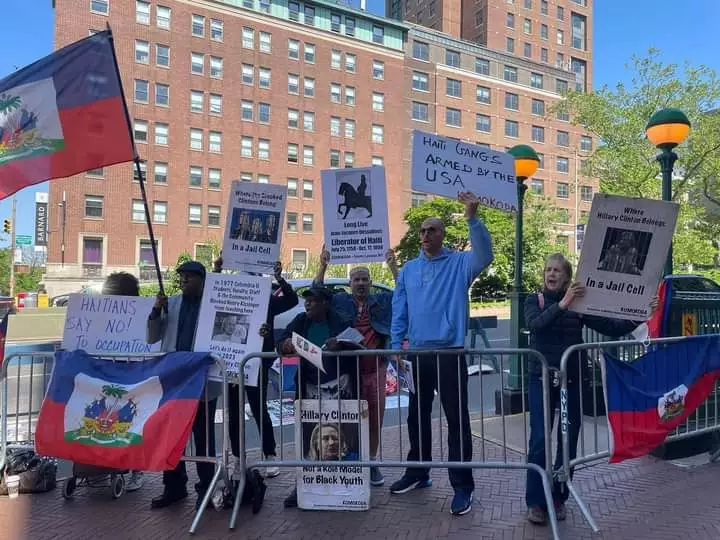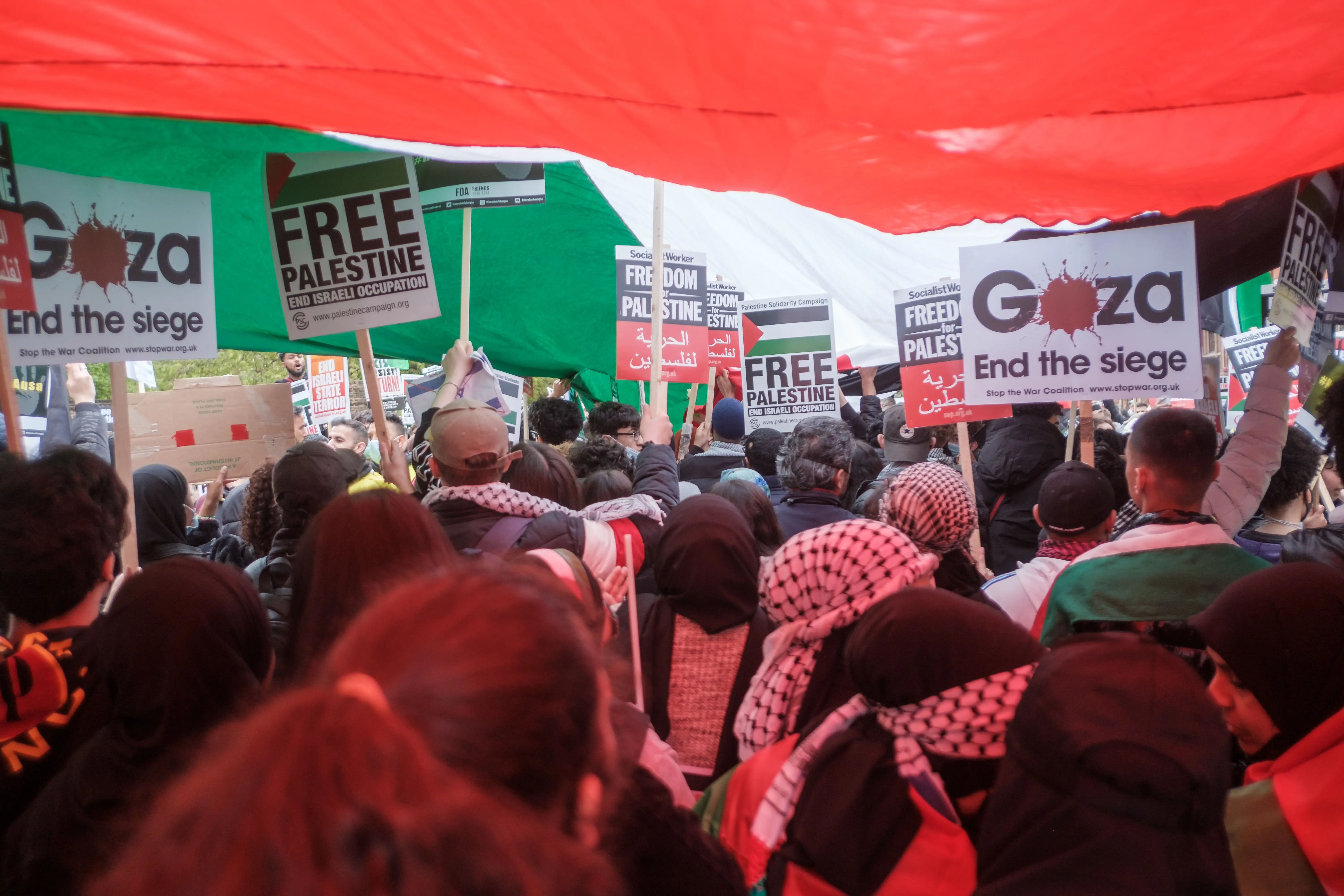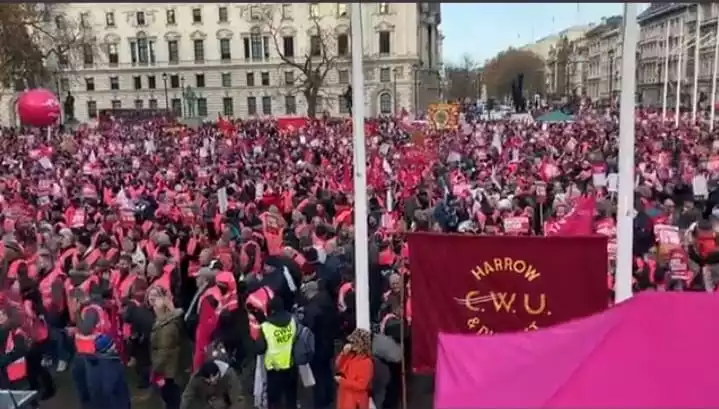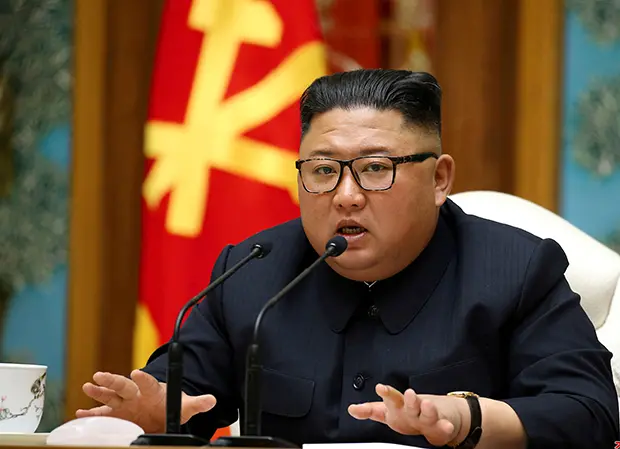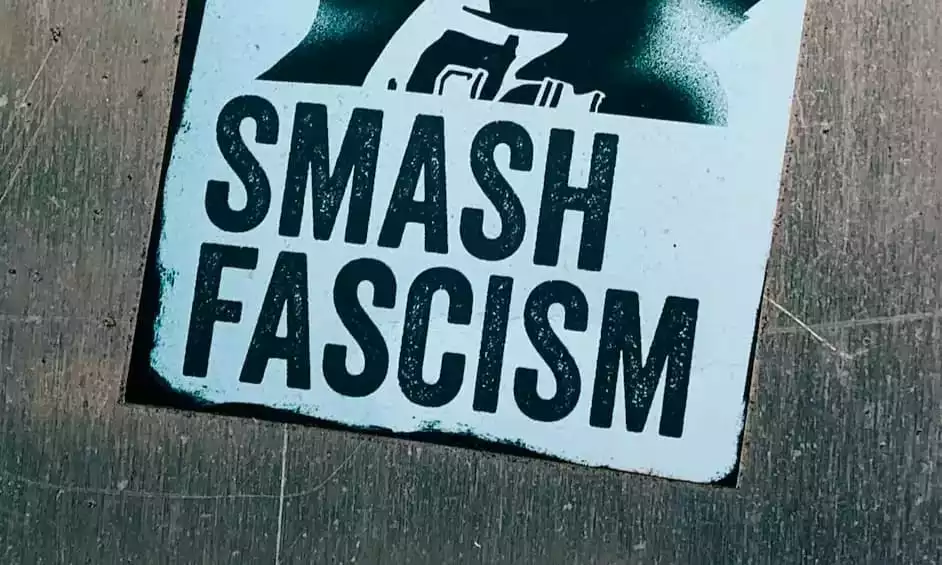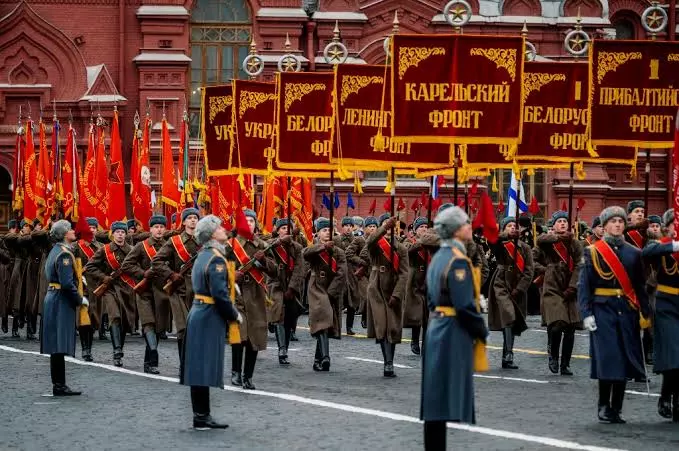Haiti, comrades, stands before us as a harrowing testament to the crimes committed by imperialist powers. More than two centuries ago, the brave Haitian people rose up against the chains of French colonialism, reclaiming their freedom from the clutches of oppression. But their audacity to challenge colonial forces came at a heavy price. Haiti has since been subjected to ongoing enslavement and punishment by Western powers, serving as a stern warning to all those oppressed across the globe.
The former coloniser, France, cunningly sabotaged Haiti's development before its departure by imposing an unbearable indemnity that it shamelessly refuses to repay. Meanwhile, the United States and Canada have colluded to coordinate invasions whenever the Haitian people dared to resist the external imposition of poverty and underdevelopment. The US occupied Haiti from 1915 to 1934 and continued to manipulate the country's public finances until 1947, syphoning off a significant portion—upwards of 40%—of Haiti's national income to pay reparations to both France and the US, all for the supposed "benefit" of having been occupied.
Haiti holds a prominent position in Canada's foreign policy agenda, as outlined in its International Policy Statement: A Role of Pride and Influence in the World. Canada's colonialist role dates back to the mid-1980s during Haiti's tumultuous transition to so-called "democracy." While Canadian peacekeeping missions grew increasingly militarised during this period, the rhetoric of Pearsonian liberal internationalism remained unchanged. As Ian McKay and Jamie Swift eloquently put it in Warrior Nation, "Over the 1990s, peacekeeping was transformed into something more closely resembling imperial policing. The enterprise entailed not respect for sovereignty but often—in the name of the 'responsibility to protect'—its systemic abrogation."
Canadian development aid was shamelessly funnelled into organisations hostile to the democratically elected government of former President Jean-Bertrand Aristide throughout the 1990s and early 2000s. Canada played a pivotal role in planning and constructing the narrative that ultimately led to the overthrow of his government in 2004. This marked the beginning of a decade and a half of violence, corruption, and chaos, which culminated tragically in the assassination of President Jovenel Moise in 2021 and the continued instability that has plagued Haiti ever since.
Aristide, a former priest who ascended to leadership through Haiti's first democratic elections after a succession of US-backed dictators, stood as a champion for the impoverished majority. He boldly doubled the minimum wage, dismantled the despised military, and refused to succumb to the US and the International Monetary Fund (IMF) demands to restructure Haiti's economy.
Central to Aristide's vision was the redistribution of the nation's wealth in a more equitable manner. Under the Lavalas administration, Haiti witnessed numerous accomplishments: a 20% increase in literacy, a 12% decrease in malnutrition, and the construction of 138 new secondary schools in just 14 years. However, the extreme power imbalance in the country, primarily controlled by a small group of affluent families backed by multinational corporations, fueled inequality. These influential families vehemently opposed the Lavalas government's commitment to collecting taxes from the rich, eventually leading to the forced removal of Aristide's administration not once but twice—first with the assistance of the Haitian army in 1991 and then again with the backing of the United States, France, and Canada in 2004.
Government documents obtained through an Access-to-Information request by Green MP Paul Manly's office and shared with The Breach lay bare the sinister nature of the Canadian government's role in Haiti's suffering. These documents provide damning evidence that foreign occupation forces, including Canada, have orchestrated the destruction of the Haitian state and the destabilisation of its society.
The concealed truths embedded within these newly unearthed documents shed light on a covert gathering orchestrated by the Canadian government. In the shadowy corners of Ottawa and Meech Lake, during the year 2003, a sinister plot was devised, laying the foundation for a future military intervention led by the United States and Canada, with the complicit support of France. Their target? None other than Haiti's democratically elected President Aristide.
At the heart of this nefarious plot lies the figure of President Jean-Bertrand Aristide, a symbol of resistance against Western powers and their oppressive economic policies. Aristide dared to challenge the conditions the United States and the IMF imposed, which sought to bleed Haiti dry through austerity measures and privatisation. His audacity to demand reparations from France, the former slave-owning nation that had robbed Haiti blind after its liberation, further infuriated the elite and their allies in France and Quebec.
In the shadows of diplomatic tension between France and the United States, the Canadian government convened the "Ottawa Initiative on Haiti" in a calculated move to lay the groundwork for the military intervention that would unfold a year later. This clandestine meeting, attended by top officials from the US, France, and organisations under their control, such as the Organisation of American States (OAS), the Francophonie, and the European Union (EU), excluded any representation from Haiti. The meeting served as a breeding ground for the concept of the "Responsibility to Protect" (R2P), a doctrine that conveniently justified military intervention by Western powers.
Canada, long involved in developing and promoting the R2P doctrine, faced resistance from Global South countries at the United Nations in 2009, exposing its true nature as a pretext for trampling over national sovereignty in the name of "humanitarian imperialism." However, the Ottawa meeting embraced this doctrine wholeheartedly, setting the stage for the following tragic events.
Per the scheduled gathering, the imperial forces convened for a convivial conference at Ottawa's Chateau Laurier hotel, graciously hosted by esteemed figures who still maintain positions of power within Global Affairs Canada. Presiding over the meetings was Denis Paradis, a Liberal Member of Parliament and Canada's former Secretary of State for Latin America, Africa, and the Francophonie under the guidance of Prime Minister Jean Chretien.
For years, Paradis, with Chretien's blessings, traversed the globe in pursuit of persuading diplomats and heads of state that foreign intervention was imperative in Haiti. The Ottawa Initiative on Haiti materialised during diplomatic tension, a mere week after Chretien refused to participate in the ill-conceived US-led invasion of Iraq.
Following the gathering, an anonymous attendee relayed their sentiments to l'Actualité journalist Michel Vastel, who penned an article with the provocative headline, "Haiti under UN trusteeship? Aristide must be overthrown - it's not the Haitian opposition calling for this, but a coalition of countries gathered at the initiative of Canada!"
In the aftermath of the meeting, internal briefings divulged that the Canadian government anxiously monitored the reactions provoked by an article published in the magazine l'Actualité. This article stood as the solitary representation within the Canadian media that unveiled discussions concerning the "overthrow of Aristide" and the proposition to "place Haiti under UN trusteeship." In response, the government devised talking points to dismiss such claims, asserting, "There was never any intention to place Haiti under trusteeship or to overthrow President Aristide.”

(Talking points from an unmarked memo released under Access to Information.)
Over the following year, the Ottawa Initiative would encompass further clandestine meetings involving the State Department of the Bush administration and various branches of the Canadian government. During these covert rendezvous, worst-case scenarios were examined alongside representatives from the United States and France, and intervention strategies were meticulously discussed.
Despite their assertions of non-military motives, Canadian officials were already weighing various options, from military intervention to civilian oversight. Classified documents uncover a sequence of secretive meetings involving Canadian government branches and their counterparts in the United States and France, contemplating worst-case scenarios and intervention strategies.
In mid-February, mere weeks before the coup in 2004, Canadian officials convened a meeting involving multiple government departments and agencies, including Foreign Affairs, the Royal Canadian Mounted Police (RCMP), National Defence, and the Canadian International Development Agency (CIDA). A memorandum summarising the discussions outlined that "speculation extends from the deployment of military intervention forces to the addition of a limited number of civilians for monitoring and observation."
And so it came to pass, on February 29, 2004, that Aristide was forcibly removed from power by the United States, with Canadian forces playing a substantial role in this coup. The elected president was promptly whisked away while Canadian soldiers secured the international airport. Five hundred and fifty Canadian personnel, including an infantry company, a helicopter detachment, and support staff, along with one hundred police officers stationed at the Port-au-Prince airport, diligently facilitated Aristide's passage out of the country.
According to the American Forces Press Service, "a team of Canadian Joint Task Force 2 (JTF2) commandos...secured the International airport." In short order, RCMP officers were engaged in training and vetting the newly reconstituted Haitian National Police (PNH).
While Canada maintains that Aristide's departure was voluntary, the Caribbean Community (CARICOM), the African Union (AU), and other concerned parties have called for an investigation into the circumstances surrounding Aristide's departure. The Canada-Haiti Action Network (CHAN) has consistently demanded the withdrawal of the Canadian government's involvement in Haiti.
The French ambassador at the time, Thierry Burkard, candidly acknowledged that Aristide's advocacy for reparations regarding Haiti's debt of over $21 billion in relation to its independence partly accounted for his ousting in 2004. Burkard informed the Times that the removal of the elected president amounted to a "coup" that was "likely influenced" by Aristide's campaign for France to repay Haiti. In the recently unveiled documentary "Truth to the Powerless," former defence minister David Pratt affirmed that "Canada, the US, and France did what was necessary to remove him from power."
The coup's aftermath unleashed terror upon the Haitian populace; political movements were targeted, dissent was ruthlessly crushed, and violence and chaos gripped the nation. The popular Lavalas party faced repeated exclusion from participating in elections, and the police, frequently accompanied by foreign soldiers, perpetrated numerous human rights abuses. Political dissidents were imprisoned without charge, innocent civilians fell victim to violence, and prominent supporters of Aristide were compelled to seek refuge or flee into exile. The Canadian-appointed Deputy Justice Minister shamelessly denied the existence of political prisoners in Haiti, despite overwhelming evidence to the contrary.
Police forces perpetrated the killing of innocent civilians, detained political dissidents without due process, and forced vital Aristide supporters into hiding or exile. Officers, often accompanied by soldiers from the United States, Canada, and later United Nations forces, embarked on a series of incursions into the impoverished neighbourhoods of Port-au-Prince. Despite the mountain of evidence pointing to the existence of dissidents in prisons, the Canadian-appointed Deputy Justice Minister, Philippe Vixamar, obstinately maintains that "there are no political prisoners in Haiti."
Amidst the rebels' post-coup campaign, the foreign-installed Prime Minister Gérard Latortue openly embraced a force predominantly composed of the PNH and soldiers from Haiti's brutal army - the same army that Aristide had disbanded in 1995. On March 19, 2004, Latortue hailed them as "freedom fighters " in Gonaives." Canadian diplomat David Lee, the head of the OAS special mission to Haiti, stood beside Latortue when he made this statement, nodding in approval. Lee claimed that they were striving to foster reconciliation. Many who had partaken in the assault against the elected government would subsequently be integrated into the police force.
Following the departure of Aristide, foreign multinationals, including Canadian mining companies, flocked to exploit the country's resources. Taking advantage of what they called "an improving business climate," Canadian mining companies laid claim to vast stretches of heavily forested lands in the island's northern region, aiming to exploit deposits of gold, copper, and silver. KWG Resources, Ste-Genevieve Resources, Eurasian Minerals, and others secured profitable concessions with the support of Ottawa, which had backed the overthrow of the democratically elected leader. However, the exploitative practices of these companies have resulted in disastrous consequences, such as mudslides and the creation of cyanide-filled craters in the countryside.
One of the critical figures aiding the Canadian-backed coup was Andre Apaid Jr. Apaid, a sweatshop owner and lead contractor for Gildan Activewear, a Canadian apparel company, was the most prominent Canadian investor in Haiti. Apaid's father had close ties to the dictator "Baby Doc" Duvalier, Jean-Claude “Baby Doc” Duvalier was the oppressive president of Haiti from 1971 until being overthrown by a popular uprising in 1986. The Duvalier Dynasty had been in power since 1959, largely because of military and intelligence support from Western powers.
Apaid’s father was one of the chief lobbyists during the US-backed military coup against Aristide in 1991-1994. In 2004, Apaid led the US and Canada-funded Group of 184, which claimed to represent "civil society" opposition to the elected government. Angered by Aristide's decision to increase the minimum wage, Apaid reportedly financed paramilitary forces led by convicted drug smuggler Guy Philippe and notorious death-squad leader Louis-Jodel Chamblain. These forces orchestrated attacks that served as a pretext for the intervention of US, French, and Canadian troops, leading to the ousting of Aristide. The US Drug Enforcement Agency even raided Philippe's home after he revealed Apaid's funding on a local radio station in 2007.
To grasp the extent of Ottawa's hostility towards a popular leader like Jean-Bertrand Aristide, who sought to lift the Haitian people "from misery to poverty with dignity," as he famously stated during the country's first-ever free election in 1990, one only needs to examine Canada's response to the devastating earthquake that struck Haiti on January 12, 2010, claiming the lives of hundreds of thousands of people. While Canada and the US took the lead in distributing "reconstruction aid," the majority of these funds ended up lining the pockets of North American corporations, NGOs, and Haitian elites, with billions of dollars being syphoned off under the guise of operational costs.
Furthermore, Canadian officials expressed concerns about the success of Venezuelan and Cuban development initiatives in Haiti. For instance, when Venezuela and Cuba agreed to fund a $20 million project to improve Haiti's health and energy sectors, the Canadian embassy viewed it as a threat to their influence. They believed this initiative would strengthen the credibility of Venezuela and Cuba in the impoverished nation, where Canadian aid had primarily focused on problematic security measures.
Instead of providing much-needed assistance, Canada chose to send troops rather than Heavy Urban Search and Rescue teams following the earthquake. Internal documents revealed that Ottawa feared a power vacuum that could pave the way for Aristide's return. They regarded the political fragility as a potential catalyst for a popular uprising and fueled rumours of Aristide's desire to reclaim power from his exile in South Africa.
In the aftermath of the earthquake, Canada organised the first "Friends of Haiti" conference in Montréal, deliberately excluding Cuba and Venezuela, despite their successful initiatives and popularity among the Haitian people. Months later, amidst the rubble of Port-au-Prince and the dire living conditions in camps, the United States and Canada pressed Haiti to hold presidential elections. Even in the face of a deadly cholera outbreak caused by reckless actions of UN occupation forces, which resulted in widespread suffering, Canada and the United States persisted with the elections that excluded Aristide's Fanmi Lavalas party. Many obstacles, including the earthquake and the cholera outbreak, prevented hundreds of thousands of Haitians from casting their votes in the November 28, 2010, election.
Following the first round of voting, Canadian and US officials intervened to remove Jude Celestin, the candidate who had secured the second-place position according to Haiti's electoral council. Despite official results indicating that Mirlande Manigat received 31 per cent of the vote, Celestin 22 per cent, and Michel Martelly 21 per cent, US and Canadian officials manipulated the process without statistical justification to push Celestin out of the runoff. Through threats of aid cuts and direct intervention by US Secretary of State Hillary Clinton, they supported Martelly's ascent. Emails obtained through the Freedom of Information Act revealed that US embassy officials collaborated with wealthy Haitians to bolster Martelly's campaign.
Once in power, President Martelly surrounded himself with former Duvalierists and notorious leaders of death squads implicated in crimes such as rape, murder, kidnapping, and drug trafficking. When Jean-Claude Duvalier returned to Haiti after twenty-five years, Martelly absurdly claimed that only "certain institutions and governments" abroad wanted him prosecuted, while no one in Haiti shared this sentiment.
In 2015, after repeated election delays, Martelly orchestrated a fraudulent poll; his chosen successor, Jovenel Moïse, emerged from the contested election redo that saw intervention from Ottawa and Washington.
Today, Haiti finds itself engulfed in one of its most profound political crises in decades. The state is in a state of decay, with Prime Minister Henry acting as an unelected president, the Senate and Chamber of Deputies no longer functioning, and gangs exerting control over significant parts of the economy. The powerful "G9" gang, led by Chérizier, is seeking to secure a place in the government's cabinet and is holding the country hostage by blocking the main oil terminal in Port-au-Prince, through which 70 per cent of the nation's oil supply flows. The remaining fragments of the Haitian state are crumbling, and the working class and the poor suffer the most as a result.
Jovenel Moïse's election, marked by a meagre turnout and marred by fraud, represents a nadir for Haitian democracy. The Moïse administration was brought to power by suppressing voters, with only one in five eligible citizens casting their votes.
As president, Moïse enjoyed unwavering support from Canada despite mounting evidence of his administration's responsibility for three massacres against political opponents in impoverished neighbourhoods. The Harvard University report released in April 2023 confirmed that the gang-led attacks were enabled and supported by state actors, including high-ranking officials in the Moïse administration and the PNH. Yet, throughout this period, Moïse, like his predecessors, benefited from Canada's nearly unconditional backing.
Canada has consistently turned a blind eye to the violence perpetrated by the Moïse administration. One of the most egregious examples occurred in November 2018 when the United Nations confirmed the Haitian government's involvement in a massacre that claimed the lives of up to 71 people in Saline, a neighbourhood in Port-au-Prince.

Threatened by the popular forces striving for sovereignty, Ottawa has repeatedly chosen to support agents of oligarchic gangsterism. In 2019, Haiti experienced one of the most sustained uprisings among the many that swept across the world that year. Triggered by a fuel price hike imposed by the International Monetary Fund, the country's urban areas witnessed multiple general strikes between July 2018 and late 2019. The people of Haiti have displayed remarkable resilience in the face of adversity, and they can rise once again against the forces of barbarism. Canadian interference will face fierce opposition as the Haitian people strive for liberation and self-determination.
The heroic struggle against the corrupt and oppressive Moïse administration raged on as the people of Haiti rose against their oppressors in the fall of 2019. On that fateful day, October 27, 2019, in the heart of Port-au-Prince, the Haitian capital, valiant protesters set ablaze business establishments and even dared to challenge the Canadian embassy. Days before this audacious act, demonstrators hurled rocks at the Canadian Embassy, unequivocally renouncing Canadian imperialism.
In response to the audacious targeting of Canada's diplomatic presence within their borders, Haiti's puppet government shamefully apologised to Ottawa. The embassy had to close its doors for a brief period. It is essential to note that Moïse managed to cling to power despite the overwhelming majority of Haitians demanding his ousting. The sole reason behind his survival was the unwavering support he received from the United States and Canada. Canadian officials consistently lambasted the protesters and defended the corrupt leader while extending their policing support and other forms of assistance.
In resonance with the immediate demand of the protesters, who called for the removal of President Jovenel Moïse, an open letter was unleashed on October 29, 2019, urging Prime Minister Justin Trudeau's government to cease bolstering the repressive and corrupt Haitian regime. The letter boldly implored the Canadian government to discontinue its support for a president who embodied corruption, repression, and illegitimacy. Notable figures such as David Suzuki, Roger Waters, Amir Khadir, Maude Barlow, Linda McQuaig, Will Prosper, Tariq Ali, Yann Martel, and over a hundred other writers, musicians, activists, and professors affixed their signatures to this missive.
Regrettably, the letter was relatively restrained, refraining from mentioning the 2004 coup, the militarisation intended to suppress potential popular uprisings following the devastating earthquake of 2010, and other crucial matters. Despite this, while several leftist media outlets featured the letter, mainstream news organisations, including those of the francophone world that regularly report on Haiti, did not mention its existence.
A year later, in February 2021, a fresh wave of protests seized the nation when Moïse unlawfully extended his term beyond its prescribed limits. Once again, Washington and Ottawa took the side of the unconstitutional and unpopular president instead of standing with the forces of the people. Merely six months later, in July 2021, Moïse met his demise within the confines of his own home, the victim of elements from his corrupt Tèt Kale Party (PHTK).
Following Moïse's assassination, a dispute emerged among the interim prime minister, the Senate speaker, and Ariel Henry, the recently appointed but unsworn prime minister, regarding who should assume the government's leadership. Astonishingly, through a mere tweet, the Core Group, composed of representatives from the United States, Canada, France, Brazil, Spain, Germany, the European Union, the United Nations, and the OAS, urged the Haitian power structure to obediently align behind Henry. It is worth mentioning that Henry possessed neither popular support nor constitutional legitimacy.
Furthermore, in the hours leading up to and following Moïse's assassination, Henry engaged in multiple phone conversations with the prime suspect in the president's killing. Notably, Henry was a member of the Council of the Wise, the body responsible for appointing the prime minister after the United States, France, and Canada ousted President Aristide in 2004.
The killing of the U.S.-backed president and its aftermath led to calls from the media for the deployment of an international military force to stabilise Haiti and prevent a humanitarian catastrophe. The interim authorities, composed of Haiti's reactionary forces, formally beseeched the United States for troops and police to safeguard vital infrastructure and aid in investigating Moïse's murder. Thus, the possibility of a new round of U.S.-led military intervention in Haiti loomed large in the wake of the president's assassination.
A renowned activist, Saint-Vil, declared, "A journalist incessantly questioned me about whether there was any nuance in our stance, whether we would support intervention, and I adamantly replied, 'No'... We even had a banner that read 'Canada out of Haiti,' and the story about the demonstration had a striking headline: 'Haitians are calling for Canada to intervene'—they already had their preconceived narrative."
Should the Biden administration choose such a course, Canada's military forces might again be summoned to play a supportive role. The Canadian-backed head of the OAS, Luis Almagro, advocated for the return of United Nations soldiers to Haiti. Similarly, Canada's permanent representative to the OAS, Hugh Adsett, implored the organisation to actively engage and act as a driving force to rally support.
Canada's ambassador to Haiti, Sébastien Carrière, took to Twitter to express his "heartbreak" over the brutal murder of two young women on the outskirts of Port-au-Prince. He decried the prevailing "politics as usual" and called upon all political, social, and economic actors to unite in a consensual transition plan to end the political crisis promptly. Carrière also organised a webinar entitled "Haiti, Emerging from the Crisis: What Support from Canada." The Responsibility to Protect doctrine emerged as a prominent theme during the discussions.
While Carrière may claim to be disheartened by the deaths of the two young women, and Canadian officials may genuinely express concern about the power amassed by criminal gangs, the reality is that Ottawa continues to back Ariel Henry, the politician responsible for Haiti's descent into chaos. Moreover, Canada has spent decades empowering violent and corrupt Haitian political figures while undermining the popular forces striving for "poverty with dignity."
The persistently biased media coverage is already being exploited by the Canadian government to justify its continued and escalating support for the PNH under the pretence of maintaining "stability" in Haiti. However, it is essential to grasp that this so-called "stability" is nothing more than a code for the Western-dominated status quo that has plagued Haiti for centuries.
Trudeau's government has steadily increased Canadian assistance to the PNH in recent years, with aid skyrocketing from $50 million in 2022 to a staggering $100 million in 2023.
As the poor of Haiti succumb to bullets, starvation, and disease, their desperate cries for a voice go unanswered. The colonialist powers' investments have focused on consolidating their control, oppressing workers, seizing land, and plundering resources to serve corporate elites' interests.
The dividends of these investments have not been directed towards the Haitian people's social, economic, or political needs. Instead, they have yielded a macabre harvest of bodies left to rot in the streets, devoured by pigs or abandoned in morgues, while communities that once stood united in their shared hunger are torn apart.
And then there are the countless hardships endured by women and girls. Shockingly, UNICEF estimates that up to 100,000 Haitian girls toil as domestic workers in conditions tantamount to slavery.
Haiti urgently needs significant political, legal, and economic changes. Besides the United States, Canada has been the biggest obstacle to the success of popular movements in recent years. Fortunately, the solution to Haiti's numerous crises manifested recently through massive widespread unrest. Despite facing repression resulting in widespread death, tens of thousands of protesters took to the streets in multiple cities, demanding Henry's resignation. They also voiced concerns about escalating insecurity and soaring prices.
The timing of the protests of August 22nd 2022, coincided with the anniversary of the 1791 revolt, which dealt a heavy blow to slavery, colonialism, and white supremacy. The enslaved Africans of Saint-Domingue, who comprised most of the population, launched a thirteen-year struggle against the brutal plantation system. Their efforts led to the establishment of an independent nation that embraced racial equality decades before similar ideas gained traction in Europe or North America. The people of Haiti have previously fought against forces of oppression, and they are capable of doing so again. In this struggle, Canadian interference will undoubtedly become a growing target of their resistance.
On September 11, 2022, the illegitimate Henry government eliminated fuel subsidies, leading to a dramatic spike in pump prices. Coupled with a 52 per cent surge in food costs, the masses have reached their breaking point, fueling a mass movement and demonstrations nationwide.
The Haitian people demand that the de facto government rescind the suffocating 128 per cent fuel price hikes implemented at the IMF’s behest. They call upon the international community to respect Haiti's sovereignty and their inherent right to self-determination, urging an end to support for Henry's illegitimate regime and an immediate cessation of interference in the nation's internal affairs.
Amid the struggle, the G9 gang took action by blocking the oil terminal in Port-au-Prince, an apparent response to the removal of subsidies. It is worth noting that despite their previous support for Henry when he came to power, they now seek his downfall. This situation poses a real threat to the imperialists, as their ally Henry could be overthrown, leading to even greater instability and unpredictability. Imperialism feared that the masses, including workers and the poor, could rise up and overthrow Henry, which would be detrimental to their interests. This is why the talk of intervention has intensified.
A critical principle of Canadian foreign policy is that the greater the power imbalance between Canada and another nation, the more distorted their actions and statements become. As a result, Canada often says one thing but does another, especially when dealing with impoverished countries. The reality is that power defines what is considered truth.
Foreign Minister Melanie Joly's recent comments about Haiti perfectly illustrate this hypocrisy. Joly has made absurd claims and statements about Haiti and Canada's role there. She announced a plan to sanction Haitian gang members to divert attention from the popular uprising against the US/Canadian-backed leader Ariel Henry. They want us to believe that impoverished young men, who can barely leave their neighbourhoods in Port-au-Prince, will be deterred by denying them the ability to shop in Montreal.
During a meeting on Haiti at the OAS summit, Joly proclaimed a plan to combat corruption in Haiti. However, this is a blatant contradiction, as Canada has spent a year undermining the Commission for a Search for a Haitian Solution to the Crisis (Montana Accord) by supporting Henry. This exposes Canada's double standards and support for a corrupt regime in Haiti.
UN Secretary-General Antonio Guterres publicly supported the deployment of a special international armed force, and the UN Security Council approved sanctions targeting the gangs, particularly Jimmy "Barbecue" Cherizier, the leader of the powerful G9 gang. The US representative on the Security Council mentioned that this is just the beginning and more actions may follow. In preparation for a potential foreign military intervention, Prime Minister Trudeau convened a meeting on Haiti at the United Nations, and Canadian ambassador to the UN, Bob Rae, travelled to Haiti and the Dominican Republic.
Their puppet Henry formally requested foreign military intervention, explicitly requesting the involvement of US and Canadian forces. On October 7, 2022, Haitian Prime Minister Ariel Henry officially called for foreign military intervention to combat the “gangs”. Soon after, Canadian and American military aircraft coordinated the delivery of Canadian-made armoured vehicles to reinforce the PNH.
Despite the claims that foreign intervention is necessary to protect Haitians from violence, the people of Haiti have vehemently opposed such plans. In protests against the intervention, one woman lost her life. The demonstrators are well aware of the long history of foreign intervention in Haiti, which has only exacerbated the country's crises. They have renamed the proposed mission MINUPAH (Mission des Nations Unies pour la protection d'Ariel Henry), in reference to the previous MINUSTAH (Mission des Nations Unies pour la stabilisation en Haïti) that occupied Haiti for 13 years following the US, France, and Canada-backed coup in 2004.
Citizens, civil society organisations, and left-wing opposition parties have vehemently rejected Henry's call for foreign military intervention, highlighting that previous interventions have not solved Haiti's problems but have deepened its crises.
The way the global community treats Haiti is shameless. Foreign powers arrive, exert their control through violence, imprisonment, and privatisation, and then congratulate themselves on their generosity and respect for human rights when they eventually leave, if they ever do.
Haiti does not need more intervention from Canada, the US, or other neo-colonial powers. These powers have supported a segment of the Haitian elite to keep the entire country underdeveloped, anti-left, and aligned with Western regional policies. These policies have only stripped away essential social services while empowering repressive state forces that target social resistance. Haiti truly needs respect for its sovereignty and the demands of its people, something it has never received from Ottawa and its allies.
During his recent visit to Canada, President Joe Biden was expected to request Canadian-led intervention to "stabilise" Haiti, citing escalating gang violence, political instability, and a cholera outbreak. In his address to the Canadian parliament, Biden mentioned that the US and Canada are collaborating with Haitian officials to address the crises.
Imposing sanctions to combat corruption in Haiti will prove ineffective as corruption permeates the entire elite and the state. Additionally, experience has shown that the burden of sanctions falls on the poor, who are the most affected. Sanctions will either have minimal impact or be manipulated by the sanctioned figures to exploit anti-imperialist sentiments for their benefit. Strengthening the Haitian state or the national police will only increase their ability to repress workers and the poor.
We witnessed this on October 17, 2022, when thousands of demonstrators took to the streets, led by the left-wing organisation Pitit Dessalines, demanding Henry's resignation and denouncing imperialist intervention. They were met with tear gas from the PNH. The masses can expect further repression and poverty, whether under Henry's corrupt clique or the gangs that wield power. Both sides serve the interests of the Haitian elite, perpetuating the exploitation of the poor.
Moreover, it is difficult to distinguish where the state ends, and the gangs begin. Strengthening the state may empower the gangs as well. The imperialists did not have a problem with the gangs as long as they did not turn against their puppet Henry. The imperialists care little about the Haitian people's suffering and the gangs' power. They claim to fight corruption while supporting the most corrupt regime in Haiti's history, responsible for embezzling billions of dollars through the PetroCaribe scandal. Their hypocrisy knows no bounds. Their concern only arises when their ally is in trouble, and the masses are mobilising.
Ultimately, the Canadian government's actions in Haiti have only deepened the wounds inflicted upon this proud nation. It is time for us to stand in solidarity with Haiti's people and demand justice for their suffering. Let us expose the imperialist forces that continue to exploit their land and resources, who manipulate nations and crush the aspirations of the oppressed. In Canada and the West, our foremost duty is to oppose our own imperialism. We must resist all forms of economic sanctions, the provision of vehicles or weapons to reinforce the police, and any military intervention.
The struggle for true liberation and dignity for the Haitian people must never waver, and we must unite in our resolve to undo the damage inflicted upon them by foreign powers and their collaborators. The spirit of resistance lives on, and the fight for a free Haiti continues!
Cover Image Credit: Danny Shaw
Editor's Note:
The views and informations expressed in the article are solely those of the author and may or may not reflect the views of The International. We believe in providing a platform for a range of viewpoints from the left.
